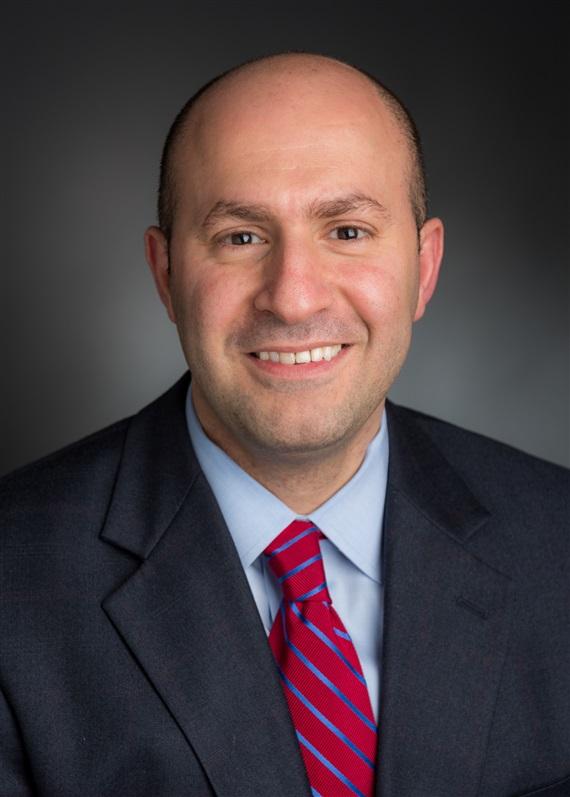Three-drug combination slows progression of advanced kidney cancer
- Patients treated with the three-drug combination had a 27% lower risk of progression or death compared to those on the two immunotherapy drugs.
- COSMIC-313 trial is the first phase 3 trial in metastatic renal cell carcinoma to use nivolumab plus ipilimumab, a contemporary standard of care, as the control arm
A targeted kinase inhibitor added to a two-drug immunotherapy combination slowed the progression of advanced kidney cancer in previously untreated patients, according to research led by an oncologist from Dana-Farber Cancer Institute.
“Patients who received the kinase inhibitor cabozantinib in addition to checkpoint-blockers nivolumab and ipilimumab experienced significantly improved progression-free survival compared to those who received only nivolumab and ipilimumab,” said Toni Choueiri, MD. Choueiri, who is the director of the Lank Center for Genitourinary Cancer, will present results of the ongoing COSMIC-313 pivotal phase 3 clinical trial during the European Society of Medical Oncology (ESMO) Congress 2022, in Paris, France.
Patients treated with the three-drug combination had a 27% lower risk of progression or death compared to those on the two immunotherapy drugs. That progression-free survival (PFS) advantage met the primary endpoint. The median PFS was not yet reached in the three-drug patient group. The median PFS was 11.3 months for patients receiving nivolumab and ipilimumab.
“This is the first study to evaluate a triplet therapy against a contemporary immune-oncology doublet control and it was designed to answer an important question of whether adding cabozantinib to dual checkpoint inhibition can improve outcomes for this patient population,” said Choueiri. “The initial findings provide a clear look at the efficacy and safety profile of this triplet therapy and demonstrate a significant progression-free survival benefit.”
The patients have been followed for between 17.7 and 20 months. Overall survival is a secondary endpoint of the COSMIC-313 trial. At this stage of the trial there was no significant survival benefit for the three-drug combination, so the trial will continue to the next analysis of overall survival.
The trial included 855 previously untreated patients with advanced or metastatic renal cell cancer (RCC) who were judged to be at intermediate or poor risk for survival according to the International Metastatic RCC Database Consortium (IMDC) risk model. Nivolumab plus cabozantinib and nivolumab plus ipilimumab are both standard of care first-line treatments of advanced kidney cancer. This is the first phase 3 trial in metastatic renal cell carcinoma to use nivolumab plus ipilimumab as the control arm.
Nivolumab and ipilimumab both work by blocking immune checkpoints, molecular “brakes” that prevent the immune system from attacking the cancer. Releasing the brakes allows the immune’s T cell army to invade the tumors and kill the cancer cells.
Cabozantinib inhibits several cancer-promoting pathways including MET, VEGFR, and TAM, and “may enhance response to checkpoint inhibitors,” said Choueiri, thus providing an additive or synergistic benefit when combined with nivolumab and ipilimumab.
The data, including detailed results of the primary endpoint of PFS, are being presented at the ESMO Congress 2022 in Paris during the Presidential Symposium III on Monday, September 12, 2022, 10:30am ET (16:30 CEST) and featured among the ESMO PR activities. The presidential session features oral presentations by authors presenting cutting-edge and significant clinical practice-changing studies.
Title/Abstract: Phase 3 study of cabozantinib (C) in combination with nivolumab (N) and ipilimumab (I) in previously untreated advanced renal cell carcinoma (aRCC) of IMDC intermediate or poor risk (COSMIC-313) (Abstract LBA8)
- Presenting Author: Toni Choueiri, MD
- Presidential Symposium III: Monday, September 12, 2022, 10:30am ET (16:30 CEST)
For all ESMO-related media inquiries, call or email Victoria Warren, 617-939-5531, Victoria_Warren@dfci.harvard.edu. Follow the meeting live on X, formerly known as Twitter, using the hashtag #ESMO22 and follow Dana-Farber News on X at @DanaFarberNews.
Media Contacts
If you are a journalist and have a question about this story, please call 617-632-4090 and ask to speak to a member of the media team, or email media@dfci.harvard.edu.
The Media Team cannot respond to patient inquiries. For more information, please see Contact Us.
